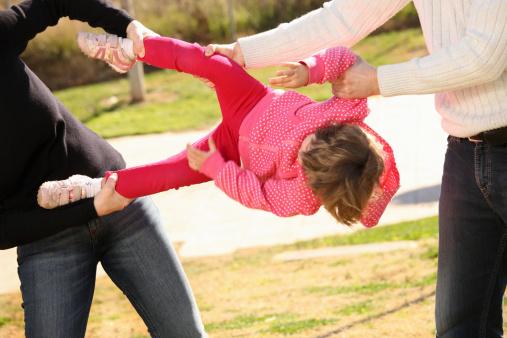When parents split up it is usually very difficult on the children. Despite the feelings they may have toward each other, parents usually try to put their feelings for each other aside and work out child custody issues together. However, when parents cannot work out custody terms on their own, the court will step in and create a custody arrangement. While the rules vary from jurisdiction to jurisdiction, all courts focus on the best interests of the child when creating custody arrangements. Indeed, a Raleigh divorce attorney explains that North Carolina law requires that courts must order a child custody arrangement that “will best promote the interest and welfare of the child.” In order to accomplish this the court will consider a myriad of factors such as the each parent’s ability to provide for the child, the relationship the child has with each parent, and the stability of each parent’s home.
Custody arrangements can be relatively simple, or they can be extremely detailed and complex. However, all arrangements involve some form of legal and physical custody.
Legal Custody
When a court awards a parent “legal custody” of a child, that parent is given authority to make all decisions about the child’s upbringing. This means that the parent with legal custody can make decisions about education, religion, and medical care without consulting the other parent. Whenever possible, courts award legal custody to both parents, so that they share in decision making. However, where there is significant animosity between the parents such that effective communication is difficult, then a court will not award joint legal custody. Where parents share legal custody, if one parent makes a decision without consulting the other parent, the excluded parent can go back to family court and ask the judge to enforce the custody arrangement.
Physical Custody
If a judge awards a parent physical custody, the children live with that parent. The child may have overnight visits with the other parent. However, the child’s residence is with the parent who has sole physical custody. A judge can also award “joint physical custody.” In that case, the child will spend substantial amount of time with both parents. Joint physical custody works best in cases where the parents live relatively close to each other. In cases where parents live far away from each other, North Carolina law allows for visitation to take place via electronic communication such as using the phone, email, or video teleconferencing.
Sole Custody
Sole custody can apply to physical custody, legal custody, or both. While most family courts prefer to award joint custody to parents, if it is in the best interests of the child, then the court will award sole custody to one of the parents. For example, if a court finds that one parent is unfit, then it will not award that parent physical custody, and instead award the other parent sole physical custody. The non-custodial parent may be awarded visitation. Visitation may involve a few hours each week, a few days each week, every other weekend, or extended periods during holidays or summer vacation. If there is a concern about the fitness of a parent, the court may order supervised visitation or no visitation at all.
Joint Custody
Joint custody is the preferred arrangement as in most cases courts view it as best for the child. With joint legal custody, also referred to as shared custody, both parents share in making decisions related to the upbringing of the child. Joint custody can also refer to physical custody where the child spends a substantial amount of time living at the homes of each parent. Joint legal and physical custody arrangements work well when the parents live near each other and get along well enough to be able to successfully make child-rearing decisions together.
The issue of child support is a separate issue from custody and visitation. However, the amount of time that the child spends with each parent may have a bearing on the amount of child support a parent pays, if any.
Older children sometimes have a significant say into which parent gets physical custody of them. In the absence of allegations of abuse, if a child does not want to spend a substantial amount of time with a parent, should the court force him or her?
